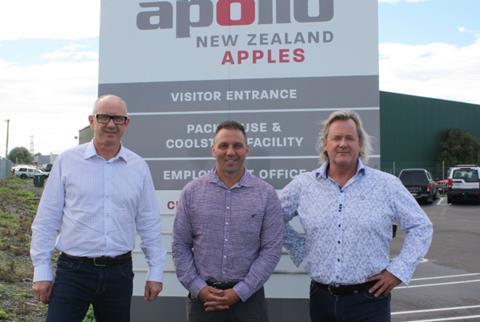
New Zealand-based group Turners & Growers’ (T&G) acquisition of Apollo Apples paves the way to ramp up its pipfruit supply base in New Zealand while removing capital constraints on its partner’s expansion, according to the respective heads of the companies.
Speaking exclusively to Asiafruit, T&G’s Alastair Hulbert said the NZ$50m transaction would buy the group a much stronger platform to grow its apple business in New Zealand as it targets ambitious global expansion in the category.
As part of its new corporate global strategy outlined earlier this year, T&G has identified pipfruit as one of three key product categories it wants to focus on.
“We’ve set a target to market 20m cartons of pipfruit globally by 2020. Around 40 per cent of that should come from the Southern Hemisphere, mostly New Zealand,” said Hulbert.
“Right now, we’re sitting at around 12m cartons [globally], and Apollo gives us another 1.4m cartons, but we want to add another 2m cartons from the Southern Hemisphere, most of which will come from New Zealand.
“Apollo will play a key role in helping us to reach that goal through its packing capacity, and by working with us to plant up new land, link up with third-party growers and reach joint venture arrangements.”
The Apollo acquisition lifts T&G share of New Zealand’s apple export business to around 35 per cent, Hulbert estimates. Last season, T&G marketed just shy of 5m cartons, he said, with a large percentage coming from third-party growers and the balance from its own plantations, which amount to 300ha. The Apollo deal will grow this to around 6.4m cartons, with plantations of around 800ha, making it the largest shipper by volume and putting it on a similar footing to Mr Apple in terms of planted area.
Apollo sheds capital constraints
For Apollo, the acquisition provides vital access to funds for expansion.
“Apollo has been doing very well; the business has grown significantly and it has strong plans that it has stuck to, but it has reached a point where it is capital-constrained,” Hulbert said. “Infrastructure-wise, it could go to a whole new level as it has the physical capacity to pack an extra 20,000-30,000 bins of fruits but that capacity is currently not being utilised. It needs to expand its supply base and optimise usage of its packhouse facility.”
Apollo Apples MD, Bruce Beaton, who has committed to stay in the business for at least the next four years, hailed the security of the investment from a respected global player in the shape of T&G’s parent company Baywa.
“We’ve been looking for capital to grow the business for the past three years and we have talked to many potential partners, but we haven’t been able to find anyone willing to take the risk,” said Beaton. “What we’ve got now with Baywa is a long-term investor in T&G, not a short-term corporate investor, but one with 80 years’ investment experience.”
“We also have a great deal of confidence in Alastair Hulbert and the new management team at T&G and we’re looking forward to working with them to execute the plans. The structure at T&G has changed; there is good management in place and we can now get on and do the business.”
Beaton, together with brother Ross and the other members of the Apollo team, expect to have a “significant influence” over the future direction of the company within the context of the T&G strategic plans. “Our team is also now part of global company, which increases opportunities for them,” he added.
Hulbert also pointed out the complimentary nature of the two businesses. “Apollo has 100 per cent dedicated supply, sourcing from its own and lease orchards through to the final consumer,” he said. “T&G has traditionally worked more with third-party growers, and they obviously give us much greater coldstorage capacity.”
Dual brand strategy
He added that T&G and Apollo would pursue a dual brand strategy, with Apollo encouraged to continue with its innovative marketing efforts independently of Enza's campaigns.
“The Apollo brand is here to stay,” said Hulbert. “Apollo does a lot of clever work around marketing one-and-a-half grade fruit and deriving better value for growers. For instance, they have a brand for fruit with minor cosmetic defects that they can offer to emerging markets without the means to pay for the higher grade Class 1 fruit.'
Meanwhile, working with a vertically integrated business like Apollo also gives T&G the opportunity to increase plantings of its proprietary Envy and Jazz varieties as well as high-colour red varieties more suited to the Asian markets.
Beaton said Apollo is looking forward to renewing orchard investments. “A lot of the orchards are getting old here in New Zealand. We need newer, larger orchards that are more productive and yield good-quality fruit,” he said. “If we wanted to buy 100ha and plant it up it would cost around NZ$10m– we need capital, and we need a strong shareholder.”
The New Zealand apple industry enjoyed a highly profitable campaign in 2013/14, and while admitting it was an exceptional year, Hulbert is confident it was not a “one-off”. Rather he feels that the recent improvement in fortunes is sustainable. “There are lot more markets open to us, a lot more markets are eating New Zealand fruit, and rising demand from Asia has been a critical factor in the revival of the industry’s fortunes.”



